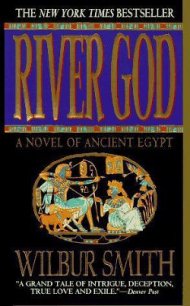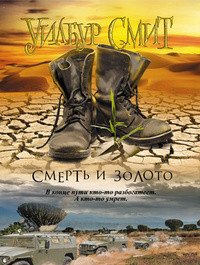Men of Men - Smith Wilbur (книги бесплатно без txt) 📗
The curved stone beak opened, the tongue was sharp as an arrow-head, and from its tip was suspended a single perfect ruby drop of blood in which a star of light glowed , and Aletta knew it was the blood of the sacrifice. The darkness about the bird was filled with moving shadows, the wraiths of the sacrificial victims, the shades of the falcon-priests dead these thousand years, gathering again to reinforce the powers, gathering again to welcome her She screamed, again and again, her terror ringing insanely in her own ears, and then firm hands were shaking her gently, tenderly. Her vision cleared again, but not completely. Everything was dim and blurred, so she screwed up her eyes, still panting wildly from her screams.
"Ralph, is that you?" The strong dark features, already taking on the set of manhood, so different from the sweet angel face of his brother, were close above her.
"Don't take on so, Mama., "Ralphie, why is it so dark!"she mumbled.
"It's night time."
"Where is jordie?"
"He is asleep, Mama; he could not keep awake. I sent him to sleep."
"Call Papa," she whispered.
"Jan Cheroot is searching for him, he will come soon., "I'm cold."
She was trembling violently, and felt him draw the rough blanket up beneath her chin before she sank back into the darkness.
In the darkness she saw the shapes of men hurrying forward, pressing about her; she caught their urgency, the passion of their terrible purpose, and she saw their arms glint in the shadows, the flash of white steel, bared and honed for war. She heard the snick of breech-block, the rattle of bayonet in the scabbard, and here and there in the press she recognized a face, faces she had never seen before but which she recognized instantly with a clairvoyant flash of intuition. One was a man full grown, bearded, strong, who was her son, riding into war, and others, so many others, her blood, her flesh, her bones going forward in that awful expectant throng. She was consumed with terrible grief for them, but she could not weep. Instead, she lifted her eyes and saw the falcon on high, clear in the single brilliant shaft of sunshine that pierced the sombre and ominous clouds that rolled from horizon to horizon, the dun and terrible clouds of war.
The falcon hovered on outstretched pinions against the belly of the clouds, twisting the cruelly beautiful head to peer down, then the long pointed wings folded and the bird dropped in a stoop like the lightning bolt, the great talons reaching forward in the strike. She saw them hook into living flesh, saw the grimace on the face that she had never seen before but knew as deeply as she did her own.
And she screamcd again. Then strong arms held her, the familiar beloved arms for which she had waited so long. She looked up at him. The clear emerald eyes so close to hers, the powerful jut of his jaw-line halfmasked by the full golden-streaked beard.
"Zouga," she breathed.
"I am here, my love."
The phantoms receded, the terrible nightmare world of her delirium was gone, and she found herself in a tent upon a dusty plain beneath a half-ruined hillock, and the bright African sunlight through the tent opening cut a stark slash of white light across the powdered red dust floor. She was mildly amazed by the swift transition from night to noonday, from fantasy to reality, and her mouth and throat were filled with the dry chalk of terrible thirst.
"I am thirsty," she whispered huskily.
He held the pitcher to her cracked lips, and the coolness and the sweetness of the liquid in her throat made her vision swim with delight.
But immediately afterwards, the memory of the nightmares assailed her and she darted a fearful glance across the tent at the silent statue. It seemed suddenly harmless, insignificant, the image blind and dumb, but a flicker of the night's terror remained.
"Beware the falcon," she whispered, and she saw in his green eyes that he thought her words were still fever ravings. She wanted to convince him but she was terribly, deadly tired, and she closed her eyes and slept in his arms.
When she awoke, the sun's rays had mellowed to a glorious orange light that filled the whole tent and lit little stars in Zouga's beard and curls. She was filled with a deep sense of peace. His arms were so strong, so all encompassing.
"Look after my babies," she said softly, but very clearly, and then she died.
Aletta's grave was just another mound of red dirt in the long, neat row of freshly turned mounds.
After he had buried her, Zouga sent the boys back to the outspan with Jan Cheroot. Jordan was weeping inconsolably, his lovely face smudged with grief. Ralph sat behind his brother on the back of the gaunt bay gelding, holding the smaller child with both arms clasped about his waist. Ralph was silent, stoic, but his body was rigid with controlled emotion, and his eyes, the same clear deep green of his father's, smouldered with unexpressed grief.
Jan Cheroot led the bay, and the two boys seemed as frail and forlorn as swallows left on a fence rail long after the others had flown the oncoming winter.
Zouga stood beside the grave with military bearing, as expressionless as his elder son had been, but behind the handsome mask he was stunned by his own sorrow and pervading sense of guilt.
He wanted to speak aloud, to tell Aletta that he was sorry, that he knew that he was responsible for this lonely grave so far from her loving family and the beautiful forested mountains of Good Hope which he had loved so dearly. He wanted to ask for forgiveness for sacrificing her to a dream, an impossible grandiose dream. Yet he knew that words were futile and the red earth stopped Aletta's ears.
He stooped and with his bare hand dressed the mound where the earth had collapsed at one corner.
With the first diamond I will buy the headstone, he promised himself silently. The red earth had stained under his fingernails, little half-moons the colour of blood.
With a supreme effort he overcame his sense of futility, overcame the self-consciousness sufficiently to speak aloud to someone who could not hear.
"I will look after them, my dear," he said. "That is my last promise to you."
"Jordie will not eat, Papa." Ralph greeted him as he stooped into the tent, and Zouga felt the leap of alarm swamp his sorrow and his guilt. He strode to the cot on which the child lay, facing the canvas wall of the tent with his knees drawn up to his chest.
Jordan's skin was burning hot as the sun-scorched rocks that littered the plain outside the tent, and his silken cheeks smeared with tears were flushed a furious fever red.
By morning Ralph was feverish also, both boys tossing and muttering in delirium, their bodies hot as two little furnaces, the blankets sodden with their sweat and the tent reeking with the carrion stench of fever.
Ralph fought the fever.
"Ja, just look at him." Jan Cheroot paused fondly in the act of sponging down the robust strong-boned body. "He takes the sickness like an enemy, and struggles with it."
Helping him, kneeling on the opposite side of the cot, Zouga felt the familiar glow of pride surface through his concern as he looked down at him. Already there were little smoky wisps of hair under Ralph's arms, and a darker explosion of curls at the base of his belly; and his penis was no longer the little wormlike appendage with a childish cap of wrinkled loose skin. His shoulders were squaring and filling with muscle, and his legs, were straight and sturdy.
"He will be all right," Jan Cheroot repeated, and Ralph thrashed out angrily in his delirium, his features scowling and dark with determination.




